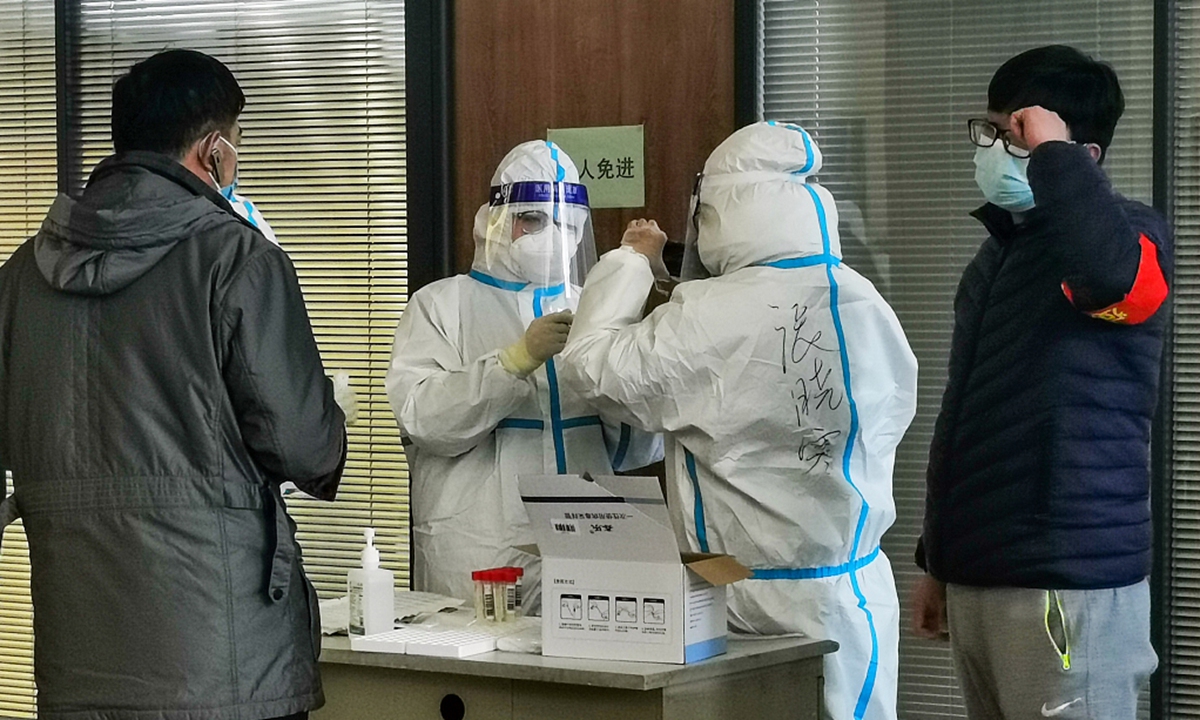Silent carriers will not cause major COVID-19 epidemic in China as long as public takes preventive measures

Shijiazhuang in North China's Hebei Province starts its second round of mass nucleic acid testing on January 12.Photo: VCG
Asymptomatic infections, sporadic cases and outbreaks in a few places will not cause another major COVID-19 epidemic in China, an official from the Chinese Center for Disease Control and Prevention (China CDC) told the public at a press conference Wednesday.
The entire world saw a resurgence of the virus in winter, and China also accordingly experienced mounting cases, including domestically transmitted sporadic infections and regional outbreaks, and the contagions have a long duration, a wide range, and spread fast. Many patients involved in the outbreak are old and live in rural areas, an official from the National Health Commission said on Wednesday, noting that the epidemic control situation is complicated and serious.
Feng Zijian, deputy director of China CDC, told media that a major epidemic is unlikely to occur around Spring Festival because silent carriers usually carry lower viral loads, have weaker infectivity, and require multiple close contacts without protective measures before they can infect others.
"As long as the public takes preventive measures, another major epidemic is unlikely," Feng said.
But cautions over imported cold-chain and other products should not be loosened, and the public should also be on the alert as Spring Festival holidays usually see frequent human movement and gatherings, the official said.
The latest outbreak in Hebei also exposed villages as a weak point in China's epidemic control work. The patients have an average age of 54 years and in many cases are family and community clustered infections.
In response to the exposed loopholes, rural areas have rolled out a three-level response system and will boost promotion of sanitary habits among villagers, and are being urged to hold fewer feasts and gatherings during the festival, said Mi Feng, spokesperson of the China Health Commission.
Villages are also required to improve monitoring and screening of returnees from other places, and also improve rural clinics' capability to detect and report suspected infections.
Epidemiological and medical resources should be prepared in advance and a quick response to an outbreak, such as transportation controls, is necessary, Mi said.
Feng from CDC noted that it has been 11 days since Hebei reported its first case, and based on previous experience, it usually takes two to three weeks to clear new infections, which means the Hebei outbreak is expected to be brought under control soon.
Officials and medical experts also noted that while the virus variants first detected in the UK and South Africa are found to be more infectious, it is not more fatal and will not affect China's epidemic control approach.
Exceptional cases of longer incubation periods do not indicate the virus has undergone any essential changes. The general 14-day centralized quarantine plus a seven-day home quarantine, which some cities have adopted, are enough to detect the virus, Wang Guiqiang, director of the Infectious Disease Department at Peking University First Hospital, said at the press conference.
Global Times

